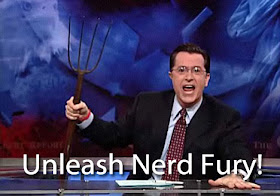 |
| Description: Stephen Colbert, dressed in a business suit & seated at a desk, raising a pitchfork. the caption reads "Unleash Nerd Fury!" |
However, though there was a lot of talk about official censorship there was never really any serious chance it would happen in America. Video games were declared free speech by the Supreme Court in 2005 in a 7 – 2 decision, and Nintendo had given up their dream of completely family-friendly entertainment by 1994. Mature content became a badge of honor to the gamer community. It was proof that the medium couldn’t be stopped by moralistic thugs determined to protect us from ourselves.So what happened?
Journalists like Leigh Alexander and Mattie Bryce as well as YouTubers like Anita Sarkeesian began looking at game content, both narrative and mechanical, and examining what that content said about us. It was not, as a lot of gamers like to claim, a call to censor or ban that content. It was just looking at it in a more thoughtful and nuanced way. With games now protected by all the power of the First Amendment, you would think that discussion over them could flourish more freely since they were in no danger of being taken away.
That’s not what happened, though. Organized retaliation against the concept of conversation and dialogue in the form of 4chan ops and GamerGate happened instead. Sarkeesian’s videos were constantly flagged on YouTube in an attempt to take them down and online campaigns to have various journalists discredited or fired became a new way of life for anyone who dared deconstructing games from a social justice perspective... Criticism of the status quo, no matter how mild, is felt like an attack on a person’s morality. Religious people in the ‘80s who were comfortable with traditional gender roles took the idea of someone else rejecting those roles as a judgment. Likewise, players who are perfectly happy with a white, male-centric, violent, heteronormative status quo in gaming feel judged for that happiness when marginalized people and their allies speak up about how it affects them.How bad has it gotten? A couple worked together for a year on a game called "That Dragon, Cancer" as a way to help process and explore their grief as well as the boundaries of games as an interactive medium. And hardcore gamers howled with outrage. Over a game a couple made born from their experiences of watching their infant son wrestle with cancer.
Unfortunately, Feminist Frequency gave the game a good review, and so of course the horde has descended on Steam to flood the forums with cries of “feels-marketing” and saying the Greens immoral for not donating profits to cancer research. Bear in mind, none of these people have actually played That Dragon, Cancer. They just hate it because a bunch of other people they normally pick on all got together and said it made them feel something.So readers, I ask you: what are moderate gamers to do? Sound off in the comments below.
No comments:
Post a Comment
Racist, sexist, homophobic, transphobic, ableist, and other slurs are not allowed. To help fight spam, comments with more than 5 links or certain spammy keywords will be held for moderation. If your comment doesn’t post right away, please be patient and I’ll approve it as soon as I can.